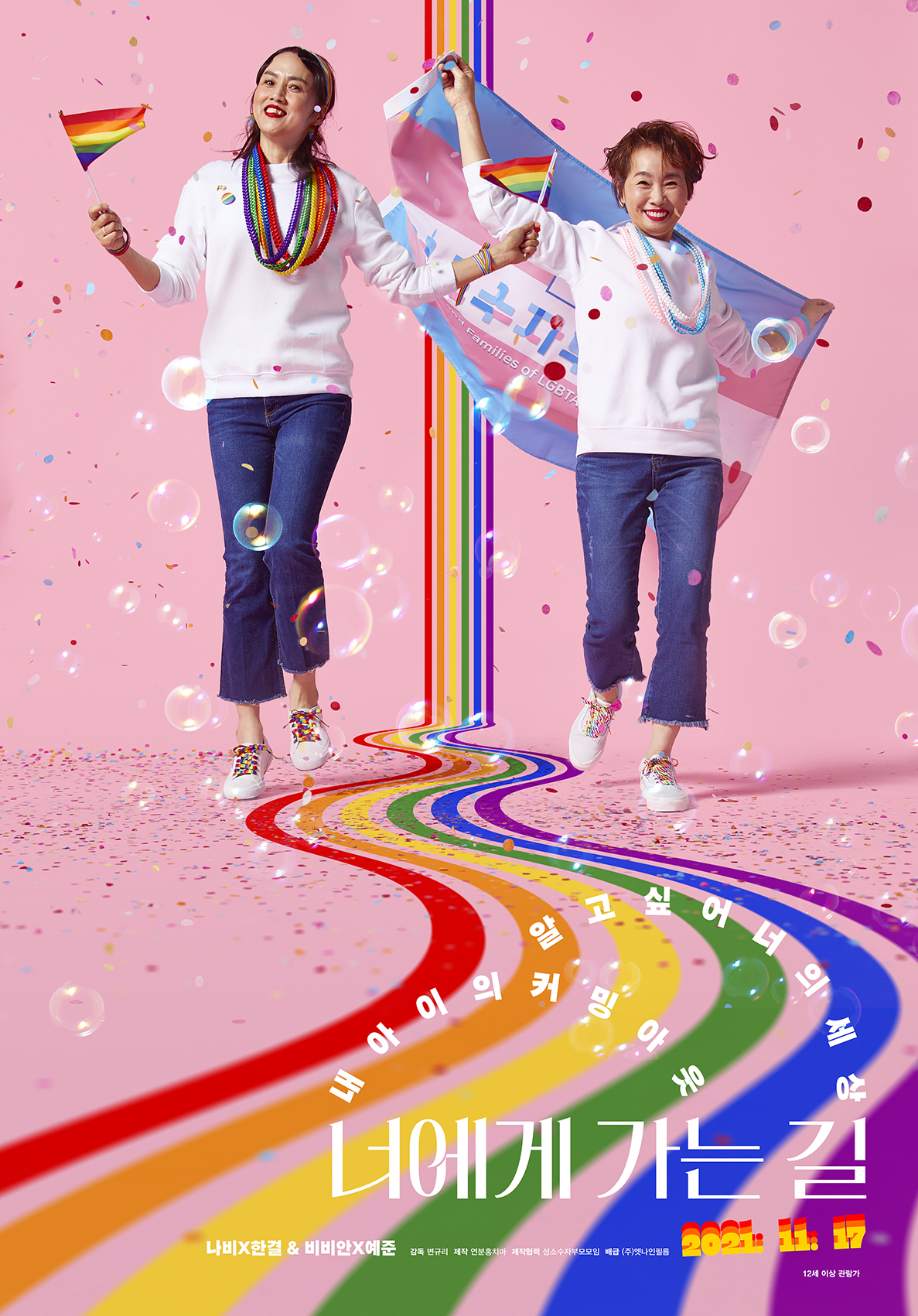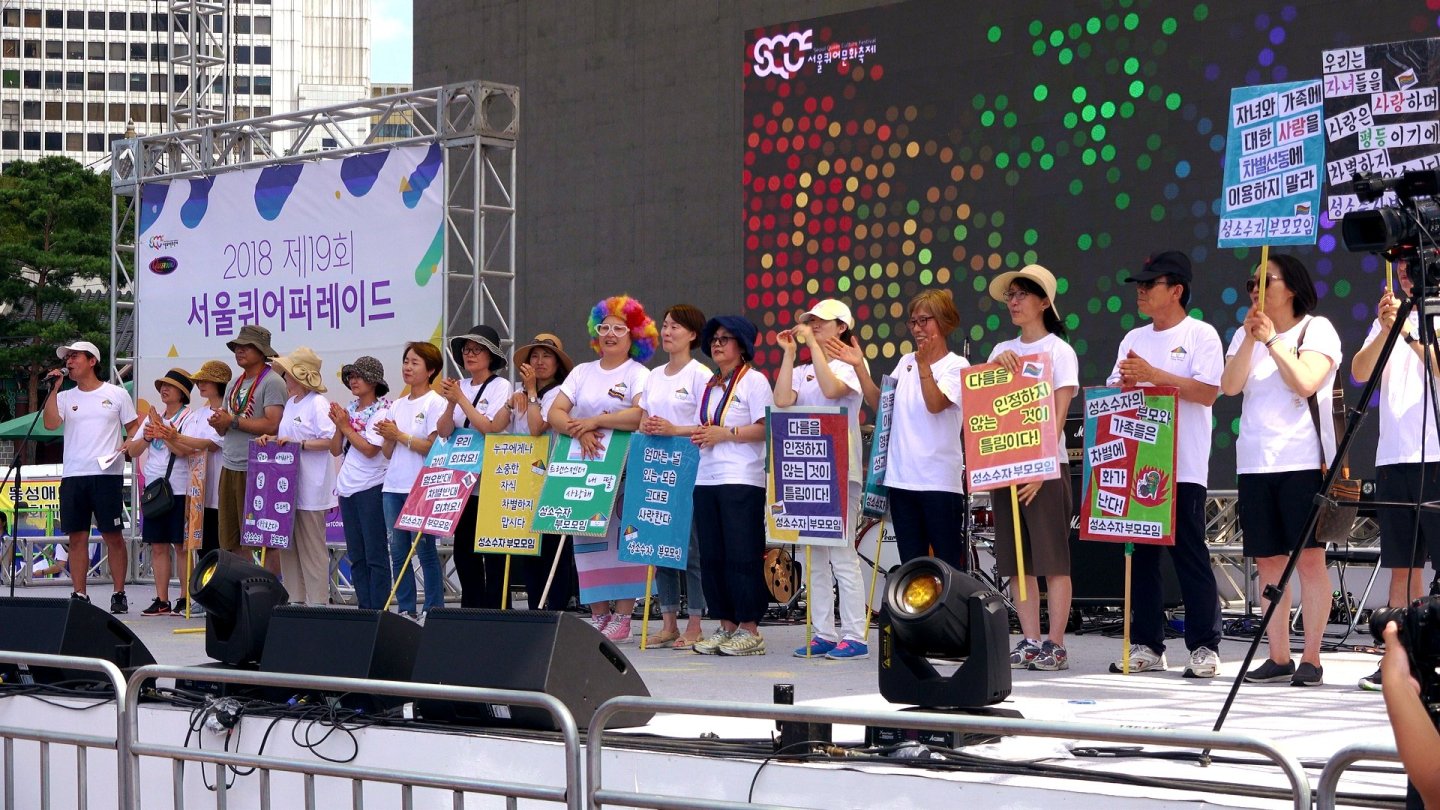
South Korea is one of the least progressive Asian nations when it comes to the rights of the LGBTQ+ community who often face social prejudice and outright hostility from the religious right. A counter protestor at a Pride rally in Byun Gyu-ri’s documentary Coming to You (너에게 가는 길, Neoege Ganeun Gil) loudly screams in the face of allies, claiming to love his nation which is why he’s bringing his kids up to be model Korean citizens while insisting, incorrectly, that homosexuality is “illegal” and the Pride goers all need to leave the country as soon as possible.
The man is perhaps an extreme case, but it’s just this kind of aggressive hostility that led two mothers to fear for their children even as they struggled internally to accept their their coming out. Firefighter Nabi had no idea what to think when her only child Hangyeol told her that they hated their body so much it had led to them experiencing suicidal thoughts. Nabi simply thought it was a phase or else that it was born of the discrimination women face in society and told Hangyeol so directly which only added to their mounting depression and sense of impossibility. Air hostess Vivian meanwhile was stunned when her son Yejoon handed her a letter that began “I am a homosexual”. Though she was accustomed to meeting all kinds of people in her work, she couldn’t quite take in what her son had told her and was then fearful that his life would be difficult or lonely going so far as to apologise for having given birth to him.
Both women have since become staunch defenders of their children’s right to happiness through their involvement with PFLAG, an organisation for parents of LGBTQ+ children yet they are still frustrated by their conservative nation and its slow progress towards equality. Hangyeol’s chief problem is that they are unable to find steady employment because of the mismatch between their identity documents and gender presentation. On trying to get their gender changed from female, which they were assigned at birth, to male, they face several hurdles including an arcane regulation that insists that even as adults those wishing to legally change their gender must have the permission of both parents (the law was abandoned only in 2019). This is obviously difficult for many transgender people who may have become estranged from their families or otherwise not wish to contact them, leaving aside the absurdity of needing to ask for permission for anything at all when over the age of majority. Meanwhile, Hangyeol also struggles because of the narrow criteria which insist that an applicant should have the matching genitalia for the gender they have requested be recognised on the form which is something they are not currently interested in pursuing. Another judge at the district level is however much more sympathetic and does not make the same demand, simply telling Hangyeol that along with their mother’s testimony all the evidence submitted makes it “obvious” that they are male, telling them to go out and live with pride while apologising for their “intolerant” nation.
Vivian’s son Yejoon meanwhile decided to escape the hostile environment in Korea to study abroad in Canada where he hoped he could live openly as a gay man but has discovered that though this is largely true he still feels somewhat out of place as a Korean living in a foreign culture. Vivian admits that she hoped he would stay in Canada though it meant him being apart from her because his life would be much easier there, though Yejoon eventually makes the decision to move home after falling in love with the friend of a friend he met on his last trip back. One of Vivian’s chief worries had been that Yejoon would be lonely. While thankful that he has found someone with whom he can share his life, she realises that being married isn’t the be all and end all yet continues to campaign for the legalisation of same sex marriage so her son can have the same legal rights as anyone else. Yejoon’s boyfriend Seongjun only recently came out to his mother who is obviously on a bit of a learning curve but quickly comes to accept the boys’ relationship and even attends a PFLAG meeting that gives her even more confidence in her decision.
Still, it’s clear that there is still a lot of prejudice to be overcome. Nabi is at one point hit in the face by an angry protestor at Pride while the police do nothing, and is intensely worried about her child’s wellbeing especially after seeing a report on the news about radical feminists hounding a transgender student out of an all female university. Yejoon and Seongjung have decided that they don’t necessarily want to be flag wavers but are determined to live happily with the support of both their families in spite of whatever social prejudice they may face. As for Vivian and Nabi, they are committed to fighting for their children’s rights, but also breaking with tradition in abandoning the hierarchal nature of the traditional family to stand shoulder to shoulder with them as they do their best to push for social change in an all too conservative nation.
Coming to You screened as part of this year’s London Korean Film Festival.
Original trailer (no subtitles)
